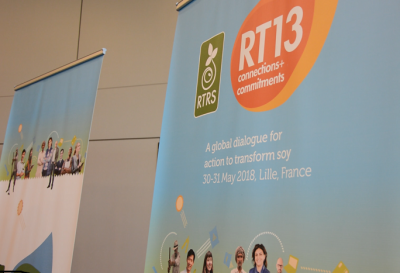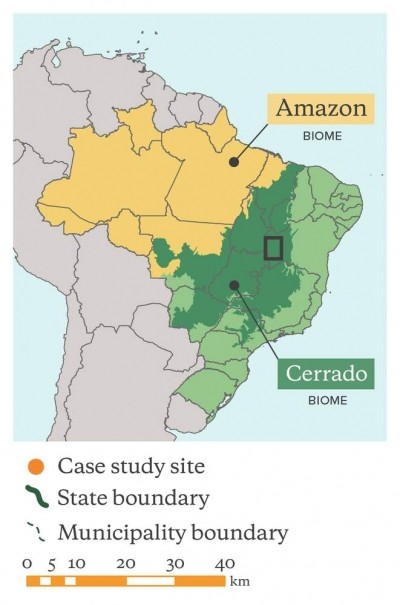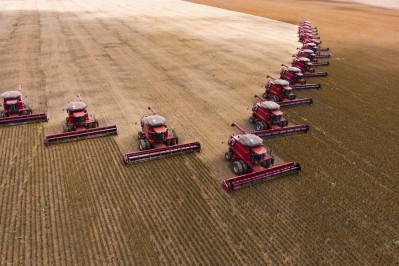Brazilian farmers signing up to soy moratorium replacement scheme

The new Forest Code regulations and the implementation of the CAR are intended to replace the Brazilian soy moratorium – a private sector voluntary agreement, which, since 2006, has prohibited participants from trading, acquiring or financing soybeans from areas of the Amazon Biome that were deforested after July 2008.
The moratorium has been given a stay of execution until 31 May 2016, by which time the soy industry asserts that Brazil's environmental governance, such as the increased enforcement and national implementation of CAR will be robust enough to justify ending the agreement.
Through the revised Forest Code, the Brazilian ministry of the environment will be able to blacklist farms that are not in compliance with their environmental obligations under CAR, and Brazil’s vegetable oil association, ABIOVE, has pledged not to source soybeans from those producers
The EU feed trade association, FEFAC, said nearly 53% of the total Brazilian acreage is now registered under CAR.
In Mato Grosso, the state where the main production of soybeans takes place, it said that 93% of the acreage is covered by the new scheme and subject to compliance with the new Forest Code.
ABIOVE said it aims to facilitate the further completion of CAR registration of rural operators through the Soja Plus Program, in partnership with the relevant Brazilian government officials.
Risk to ending moratorium flagged
A study to evaluate the soy moratorium, published in the journal Science in January this year, show that it has made a major contribution in ensuring a reduction in deforestation in Brazil since its introduction.
Prior to the moratorium, soy accounted for roughly a fifth of recent deforestation, while today its share is less than 1%.
The authors of that study, led by Holly Gibbs of the University of Wisconsin in the US, argue that ending the soy moratorium prematurely would risk a return to deforestation, as full compliance and enforcement of the CAR and Forest Code regulations is likely to be years away.
New RTRS guidance
Meanwhile, the Round Table on Responsible Soy (RTRS), has released new guidance on responsible expansion of soy to “help to pre-assess the risk for the ecosystems in various areas, thus avoiding any negative impact from the expansion of cultivation.”
The RTRS said producers from South America, India, Canada and the US, along with traders, buyers, and NGO representatives attended a Brussels based conference yesterday, with all stakeholders expressing support for the RTRS target of getting 10 million tons of responsible soy on the market by 2017, up from 1.3 million tons currently.
Hugo Byrnes, VP of integrity of Royal Ahold and member of the Retailers’ Soy Group, said transformation can only be achieved when manufacturers and retailers all specify sustainable soy. “Only then can we achieve the critical mass necessary to let certified soy enter Europe and be used as feed."
Feed trade group weighs in on soy sourcing debate
In March this year, FEFAC published ‘draft’ soy sourcing guidelines aimed at helping to resolve the “disconnect in the European debate over responsible soy cultivation and facilitate greater mainstream market supply for sustainable soy.”
Ruud Tijssens, president of the trade association, told us then:
“In certain markets the topic of responsible soy farming is very high on the agenda as in North-Western Europe, and the debate tends to be led by downstream players in the chain such as retailers or dairy companies. In markets in Southern and South-Eastern Europe that debate is virtually non-existent. While stakeholders in other markets tend to weigh in more on the non-GMO supply.
Moreover, the definition of responsible soy production varies from market to market – for some it is about ensuring no deforestation in the Amazon, for others it is about good agricultural practices and crop protection methods.
In order to ensure that soy supply to Europe would not be undermined by this lack of coherence and potentially diverse production stipulations in regard to what exactly constitutes responsible soy production, FEFAC recognized it had to step in and generate some homogeneity on this topic.
We have now produced a draft set of sourcing guidelines based on a set of minimum criteria that are open to stakeholder consultation until May.”
The parameters, which are backed by EU vegetable oil and protein meal industry (FEDIOL) and were also developed in consultation with farmer groups in Brazil, the US and Argentina can play an important role in setting a base level for responsible soy supply for the EU market, he said.
Six basic principles
The guidelines focus on legal compliance, environmental responsibility, good agricultural practices, protection of community relations, respect for land rights and responsible working conditions.
These tenets are translated into ‘essential’ and ‘desired’ social, good agricultural practice, environmental criteria and verification rules and are “designed to promote the implementation of continuous improvement plans by interested member organizations,” said FEFAC.
The trade group said it has also been involved in setting up an independently operated benchmark system to compare other soy programs against the FEFAC guidelines.
“There are now a plethora of different responsible soy programs from soy shippers, traders and farmer associations in the US, Brazil and Argentina. They all say they want to do it their way – we think that is fine as long as such schemes are viable, are transparent, and meet certain standards.
In this context, we have been collaborating with the International Trade Center (ITC) to develop a filter system – a benchmarking tool that such schemes can show compliance with the FEFAC guidelines,” said Tijssens.
It is supposed to go live in July this year and the FEFAC president hopes such an initiative will stimulate the continuous improvement of existing schemes.
Sibyl Anwander, the former executive director of the ProTerra Foundation, a non-profit group that supports the sourcing of sustainably produced, non-GM crops for feed and food, said it backed this approach from FEFAC and the work that has been achieved “after ten years’ of discussion.”
Zero net deforestation
However, she notes one weak point in that the guidelines do not endorse the zero net deforestation target – a firm objective for ProTerra and the Round Table on Responsible Soy (RTRS). “Although the presentations given last week show that there is still potential to increase production without new deforestation,” added Anwander.
“We support the principle of zero net deforestation as demanding zero deforestation per definition is an unrealistic target but zero net requires synergetic efforts from both the private and public sectors – it needs the involvement of national authorities.
As it stands, our guidelines are in line with the revised Brazilian Forest Code, which together with the federal monitoring of farms under the rural environmental registration (CAR), we see as a real breakthrough in terms of enabling responsible soy production,” said Tijssens in response.











